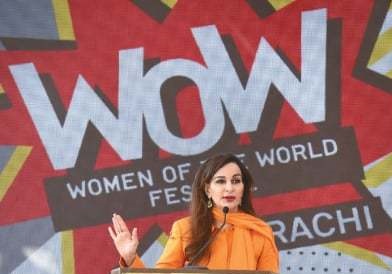WOW festival has always showcased strong women: Senator Sherry Rehman

Islamabad: Senator Sherry Rehman Saturday said WOW festival has always showcased strong women who have led the battle against patriarchy and its daily oppressions.
“It has curated an inclusive space where women can identify fresh challenges and address old ones,” she said addressing the WOW Pakistan opening session
Discussing the effect of the pandemic on women, she said, “Women have been at the frontline of identifying and treating Covid-19 patients, and have been the most vulnerable to contracting the infection as well. It is high time that we talk about how women are at the core of the huge care and response efforts that are currently underway to combat the pandemic, and yet have emerged as the hidden statistic of shame”.
“Patriarchy in its neo-liberal and traditional structural avatar has interlocked in dangerous ways with the pandemic to strip women of rights and incomes, to burden them with care, and to hide the scars of violence and abuse they face at home, especially in pandemic isolation. Patriarchy is as bad or worse than any tyranny, colony or oppressor. It is a system of social organization that enforces violent exclusions and mortalities, deaths in many cases. Acid crimes, rapes, honour killings make it to the headlines. But the pandemic has silently colluded with patriarchy to bring back, reinforce and amplify a de-humanising era of overt and covert discriminations,” she added.
Highlighting the increase in domestic violence cases, Rehman said, “The UN has called the global increase in domestic abuse a “shadow pandemic”. In Pakistan, 28% of women aged between 15-49 have experienced physical violence since the age of 15, and 6% have experienced sexual violence. Before this pandemic began, some 90% of Pakistani women were already experiencing some form of physical, emotional or psychological abuse, mostly from an intimate partner. Now women have to battle the male aggressor inside and the virus outside. As per a recent report by the Aurat Foundation, Pakistan reported 2,297 cases of violence against women from 25 districts between January and December 2020”.
“The crisis caused by the COVID-19 pandemic has had a negative impact on the economic autonomy of women. COVID has threatened not only their income, but also any autonomy and agency they may have acquired in the process. As it stands Women in Pakistan account for only 24% of formal employment in Pakistan,” she said.
Discussing the healthcare system, she said, “Women have been exposed to the frontlines of a global pandemic in a health system where social hierarchies still prioritise men as first recipients of nutrition or healthcare. According to UN data, 48.1% of Pakistani women have no say in their health decisions and now COVID-19 has also disrupted essential health services for women and children. A large majority of our nurses and health workers are female but despite this, government’s attitude towards them is questionable. Recently hundreds of lady health workers from across the country gathered in Islamabad to protest against their low salaries, pay structure and scale”.
Access to education was already a problem in Pakistan as 22.8 million of Pakistan’s over 70 million children are out of school and over 300,000 schools were closed since March due to the coronavirus outbreak. The schools have been opened now but prolonged closure could exacerbate the inequalities in educational attainment as this will result in higher rates of female absenteeism and lower rates of school completion. Educational opportunities for girls have declined after the lockdown. The Mobile Gender Gap Report 2020 highlights that Pakistan has the highest mobile internet usage gap of 49% with 37% Pakistani males against 19% females having access to mobile internet. With the world moving towards a more digital existence, women and girls with limited access to the internet are likely to suffer in terms of both employment and study,” Rehman said.
Talking about how policies must chart a path that is inclusive and shared, she said, “While making policies to mitigate negative consequences for women, special attention needs to be devoted to reducing rather than exacerbating existing gender inequalities. The Sindh Home-Based Workers Act of 2018 and The Sindh Women Agriculture Workers Act of 2019 are all steps in the right direction. The Sindh Home-Based Workers Act of 2018, which seeks to formalise the status of home-based workers, to offer greater social and legal protection, as they have consistently been victims of exploitation by employers and contractors. Whereas, The Sindh Women Agriculture Workers Act of 2019 has formalised the role of women in the field, and lays the groundwork for equal pay, minimum wage and working hours and prevention from harassment and discrimination”.
Senator Sherry Rehman concluded her speech by saying, “The 21st century has brought with its own challenges and therefore put women squarely at the centre of conflict, climate change and of course Covid-19. The impacts of crises are never gender-neutral, and COVID-19 is no exception”.





